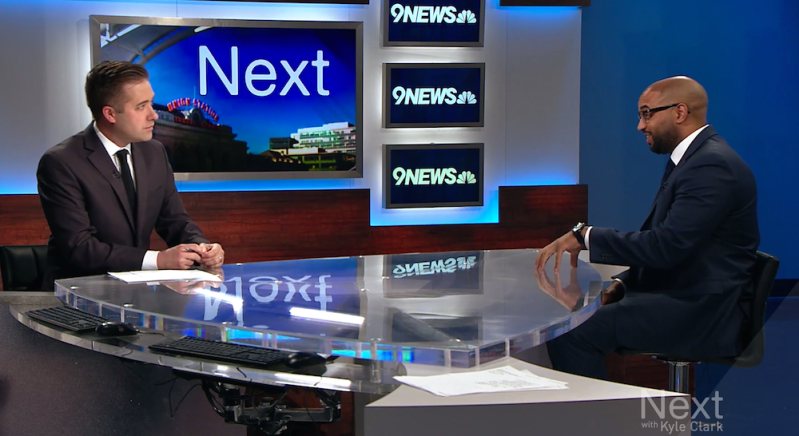Let’s Be Honest: To Improve Transit, Denver Has to Claim Street Space From Cars
Finite street space is a fact of city life, so transportation officials might as well be clear and forthright about how to make the best use of it.

Denver Public Works Director Eulois Cleckley sat down with Kyle Clark of 9News on Thursday for a segment on the city’s plans to, in Cleckley’s phrase, give people more “mobility choices.”
Clark’s interview framed the topic in terms of tradeoffs with cars. “Is it inherent that if you make the city friendlier to transit, it has to become unfriendlier to single occupancy vehicles?” he asked.
It’s a loaded question that boils complex issues down to a zero-sum cars-versus-transit formula. Cleckley, who lives car-free, was exceedingly polite. “No, in my personal view it doesn’t,” he answered.
He went on to thread the needle by saying “balance” must be preserved for people who drive.
I get it. Cleckley has to be diplomatic. It might cause a stir to go on the evening news and tell a city built for cars that we need to start doing things differently.
But the fact is, Denver needs to start doing things differently, and one thing that needs to change is our culture of politeness that avoids telling necessary truths. Like the truth that a growing city like Denver needs a transportation system in which people drive less.
If you listen closely to Cleckley, you can tell that he’s saying Denver has to improve walking, biking, and transit or else too many people will stay stuck in traffic, with no option but driving. “Traffic means more people are coming in,” he said. “That’s not a bad thing. The bad thing is the delay that a lot of people are caught up in because they have limited mobility choices.”
He’s not wrong. It’s just hard to discern a clear and compelling vision for the future of Denver’s transportation system.
I happened to listen to Streetsblog’s latest Talking Headways podcast just before watching this interview. In it, Jeff Wood interviews Jarrett Walker, a transit planner who consulted on Denver’s forthcoming transit blueprint. The entire podcast is worth a listen, but particularly relevant was Walker’s experience with “colleagues who believed that the way you get through a process is to not upset people.”
From the podcast:
[I was] watching these processes that were designed on this principle leading to nothing but vagueness, and not leading to decisions that had any resilience, because nobody knew what they decided, because they were too busy being nice to each other and not upsetting each other.
And I decided to take a different path, which was to concentrate on being clear, and to accept that that is going to upset some people. And one of the reasons I like to work at the citywide altitude is that with something like a network redesign, it’s okay for a lot of people to be upset because there’s something bigger we’re doing here that has payoffs, that I can show, that are worth upsetting a certain number of people. That’s the only way you get anything done.
So let’s be honest: Denver’s transportation problems are a matter of basic geometry. Driving will always be a choice, but we’ll choke on traffic if we don’t claim street space to make other choices more attractive.
Buses and trains move more people in less space than private cars and trucks. Yet city streets allocate almost all of our public space to cars, perpetuating traffic, pollution, and loss of life. The truth is that improving transit will require repurposing space that’s traditionally been reserved for cars — like the Colfax bus rapid transit line promises to do. Let’s not shy away from saying so.


